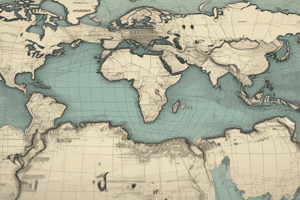Podcast
Questions and Answers
What was the main objective of the Marshall Plan, also known as the European Recovery Program?
What was the main objective of the Marshall Plan, also known as the European Recovery Program?
To help finance rebuilding efforts in Western Europe following the devastation of World War II.
What was the condition of post-war Europe according to reports provided to Marshall?
What was the condition of post-war Europe according to reports provided to Marshall?
Some regions were on the brink of famine due to disrupted agricultural and food production, and many cities were partly or wholly destroyed.
What was the extent of damage to Europe's transportation infrastructure during World War II?
What was the extent of damage to Europe's transportation infrastructure during World War II?
The damage was extensive, with railways, electric utilities, port facilities, roads, bridges, and airports affected by airstrikes and artillery attacks.
Who was the brainchild behind the Marshall Plan, and how did it get its name?
Who was the brainchild behind the Marshall Plan, and how did it get its name?
What was the duration of the Marshall Plan, as initially crafted?
What was the duration of the Marshall Plan, as initially crafted?
What was the primary concern of the Soviet Union and its satellite states that led to their refusal to participate in the Marshall Plan?
What was the primary concern of the Soviet Union and its satellite states that led to their refusal to participate in the Marshall Plan?
What percentage of the U.S. gross domestic product was allocated to the Marshall Plan?
What percentage of the U.S. gross domestic product was allocated to the Marshall Plan?
How was aid distributed to the participating European nations under the Marshall Plan?
How was aid distributed to the participating European nations under the Marshall Plan?
Why did West Germany receive significant assistance under the Marshall Plan despite being a former Axis power?
Why did West Germany receive significant assistance under the Marshall Plan despite being a former Axis power?
What percentage of the total aid provided under the Marshall Plan did Great Britain receive?
What percentage of the total aid provided under the Marshall Plan did Great Britain receive?
Flashcards are hidden until you start studying
Study Notes
The Marshall Plan
- Enacted in 1948, the Marshall Plan was a U.S. program providing aid to Western Europe after World War II, providing over $15 billion in financing for rebuilding efforts.
- Named after U.S. Secretary of State George C. Marshall, the plan aimed to reconstruct cities, industries, and infrastructure heavily damaged during the war and remove trade barriers.
Post-War Europe
- Europe was in a dire state after World War II, with millions killed or wounded, and cities like London, Dresden, and Berlin partly or wholly destroyed.
- Agricultural production was disrupted, leaving some regions on the brink of famine.
- The region's transportation infrastructure, including railways, utilities, ports, roads, bridges, and airports, suffered extensive damage.
Formulation and Response
- The Marshall Plan was formulated after a meeting of participating European states in 1947.
- Invitations were extended to the Soviet Union and its satellite states, but they refused to join, allegedly fearing U.S. involvement in their national affairs.
Implementation and Impact
- President Harry Truman signed the Marshall Plan on April 3, 1948, and aid was distributed to 16 European nations, including Britain, France, Belgium, and Norway.
- The aid amounted to 5% of the U.S. gross domestic product at the time, highlighting the significance of America's involvement.
- The plan provided aid on a per capita basis, with larger amounts given to major industrial powers like West Germany, France, and Great Britain.
Distribution of Aid
- Nations that fought with the Axis powers, like Italy, and neutral countries like Switzerland received less assistance per capita than those who fought with the United States and the Allied powers.
- West Germany received significant aid, seen as essential for regional economic stability and as a rebuke to the communist government in East Germany.
- Great Britain received roughly one-quarter of the total aid, while France received less than one-fifth of the funds.
Studying That Suits You
Use AI to generate personalized quizzes and flashcards to suit your learning preferences.




